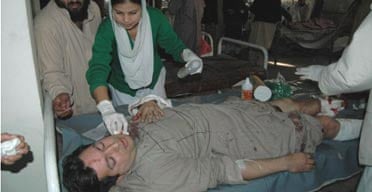More than 50 people were killed today when a suicide attacker detonated a bomb at a crowded mosque near the home of Pakistan's former interior minister on one of Islam's major holidays.
The bomber blew himself up as worshippers held prayers on the holy day of Eid al-Adha at the mosque inside Aftab Khan Sherpao's sprawling compound in Sherpao, a village 20 miles from the city of Peshawar, in Pakistan's North-West Frontier Province.
The bomber had apparently sat in the front row of worshippers and begun to pray before exploding the device.
"We were saying prayers when this huge explosion occurred," Shaukat Ali, a 26-year-old survivor of the blast, told reporters. "It almost blew out our ear drums. Then it was it was like a scene from Doomsday."
Television pictures showed blood-stained clothes and skull caps strewn across the mosque's marble courtyard. Hundreds of locals were celebrating the festival with Sherpao and his family. Witnesses said the dead included police officers guarding the former minister, who was praying in the mosque at the time of the attack.
Local police chief Feroz Shah said: "According to my reports so far, 55 are dead but we are checking this figure, and over 100 are wounded."
Suspicion will likely focus on the "Pakistani Taliban" or al-Qaida militants who are believed to have set up bases in the rugged northwestern region of the country. Police raided nearby madrasas immediately after the attack.
Sherpao, seen as close to President Pervez Musharraf, survived the attack and toured hospitals soon after to comfort the maimed and injured. "Yes, I'm fine," Sherpao told The Associated Press in a brief telephone interview. One of his sons was rushed to hospital.
The former minister, once a supporter of Benazir Bhutto, is contesting next month's parliamentary elections. In office he took a strong anti-militant line, a conviction strengthened after a suicide attack killed 29 people at a public rally in his constituency Charsadda earlier this year.
President Musharraf had justified imposing emergency rule in November saying that that it was needed to stop a "wave of terrorism and militancy". Critics said it was merely a cover to prolong his presidency.
The state of emergency was lifted last weekend after the president said there had been a "considerable improvement" in the country.
However a recent wave of attacks, which has seen seven suicide bombings in the past two weeks, appear to be a direct challenge to the government's authority.
Islamic militants appear to have embarked on a bloody campaign designed to undermine claims that they had been contained. Analysts say almost 800 people have died this year from attacks this year.
